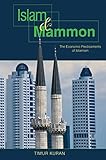Islam and Mammon : The Economic Predicaments of Islamism / Timur Kuran.
Material type: TextPublisher: Princeton, NJ : Princeton University Press, [2010]Copyright date: ©2004Edition: Course BookDescription: 1 online resource (240 p.) : 1 halftone. 2 tablesContent type:
TextPublisher: Princeton, NJ : Princeton University Press, [2010]Copyright date: ©2004Edition: Course BookDescription: 1 online resource (240 p.) : 1 halftone. 2 tablesContent type: - 9780691126296
- 9781400837359
- 330.91767
- HB126.4
- online - DeGruyter
- Issued also in print.
| Item type | Current library | Call number | URL | Status | Notes | Barcode | |
|---|---|---|---|---|---|---|---|
 eBook
eBook
|
Biblioteca "Angelicum" Pont. Univ. S.Tommaso d'Aquino Nuvola online | online - DeGruyter (Browse shelf(Opens below)) | Online access | Not for loan (Accesso limitato) | Accesso per gli utenti autorizzati / Access for authorized users | (dgr)9781400837359 |
Frontmatter -- Contents -- Preface -- CHAPTER ONE. The Economic Impact of Islamism -- CHAPTER TWO. Islamic Economics and the Islamic Subeconomy -- CHAPTER THREE. Islamism and Economics: Policy Prescriptions for a Free Society -- CHAPTER FOUR. The Genesis of Islamic Economics: A Chapter in the Politics of Muslim Identity -- CHAPTER FIVE. The Notion of Economic Justice in Contemporary Islamic Thought -- CHAPTER SIX. Islam and Underdevelopment: An Old Puzzle Revisited -- Notes -- References -- Index
restricted access online access with authorization star
http://purl.org/coar/access_right/c_16ec
The doctrine of "Islamic economics" entered debates over the social role of Islam in the mid-twentieth century. Since then it has pursued the goal of restructuring economies according to perceived Islamic teachings. Beyond its most visible practical achievement--the establishment of Islamic banks meant to avoid interest--it has promoted Islamic norms of economic behavior and founded redistribution systems modeled after early Islamic fiscal practices. In this bold and timely critique, Timur Kuran argues that the doctrine of Islamic economics is simplistic, incoherent, and largely irrelevant to present economic challenges. Observing that few Muslims take it seriously, he also finds that its practical applications have had no discernible effects on efficiency, growth, or poverty reduction. Why, then, has Islamic economics enjoyed any appeal at all? Kuran's answer is that the real purpose of Islamic economics has not been economic improvement but cultivation of a distinct Islamic identity to resist cultural globalization. The Islamic subeconomies that have sprung up across the Islamic world are commonly viewed as manifestations of Islamic economics. In reality, Kuran demonstrates, they emerged to meet the economic aspirations of socially marginalized groups. The Islamic enterprises that form these subeconomies provide advancement opportunities to the disadvantaged. By enhancing interpersonal trust, they also facilitate intragroup transactions. These findings raise the question of whether there exist links between Islam and economic performance. Exploring these links in relation to the long-unsettled question of why the Islamic world became underdeveloped, Kuran identifies several pertinent social mechanisms, some beneficial to economic development, others harmful.
Issued also in print.
Mode of access: Internet via World Wide Web.
In English.
Description based on online resource; title from PDF title page (publisher's Web site, viewed 30. Aug 2021)


